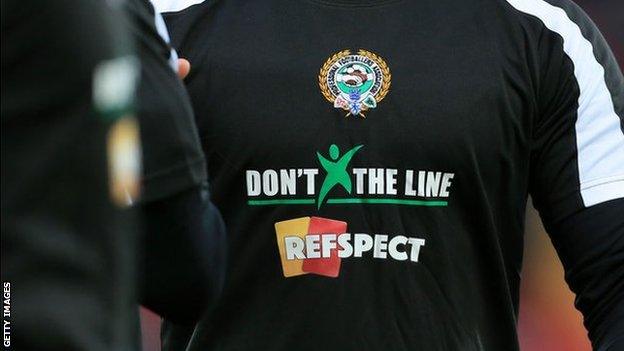Referees & abuse: 'Massive rise in mental health support requests'
- Published

There has been a "massive" increase in the number of amateur football referees seeking support because of some players behaving like "caged animals" after the first coronavirus lockdown, says a charity.
Martin Cassidy, chief executive of Ref Support UK, is concerned for officials' mental health and fears many will not return to grassroots sport after the pandemic.
"This small minority is affecting it," said Cassidy. "This small minority is getting bigger and bigger. Post-lockdown, they're coming out of it like caged animals.
"People are threatening referees over throw-ins now, that never used to happen. Real aggression is coming out on social media and on the ground.
"We're worried for the game. Demand for our service has increased year on year. The biggest significant increase has been since we restarted after lockdown.
"Over all the previous years, there is no four-month period that has matched it."
'Three in five experience abuse every two games'
Cassidy's concerns come alongside a separate piece of research by the University of Portsmouth which found three in five referees they spoke to in England said they experienced verbal or physical abuse every couple of games.
The research - collated in a new book, Referees, Match Officials & Abuse - also found 93.7% of match officials they interviewed said they have experienced verbal abuse - higher than other sports such as cricket (56.5%) and rugby union (53.7%), and significantly higher than in other European countries.
Dr Tom Webb, co-author of the book, told BBC Sport: "Abuse is still a significant issue, probably the biggest in refereeing. Mental health within referees is intrinsically tied to abuse."
According to the Football Association, which governs the game in England, assaults occur in 0.007% of matches, approximately two a week.
An FA spokesperson told BBC Sport: "We work alongside our County FA network to offer all referees in their local area appropriate support.
"Each County FA has a point of contact for all referees, commonly a referee development officer, who provides guidance, coaching and advice - for both on and off the field of play - and can support any grassroots referee who requires help and guidance on mental health matters."
'The abuse is too much to continue' - case study
Joshua Weller, 21, has not picked up his whistle for more than 18 months.
Following constant verbal abuse and an incident in a men's game in which he was headbutted and spat at when he was 18 years old, he has taken a break.
"It's such a clearer picture. You can get on with your week without having to worry about what is going to happen at the weekend," he said.
"The verbal abuse just comes from kick-off. It's not just the players - it's the parents, it's supporters and it doesn't make it nice to be there.
"It sticks with you. You wake up the next day and you still feel rubbish."
Weller says the professional game has to be tackled first in order for amateur referees to be better treated.
"They see the professionals on TV and the referees abused by those players and nothing gets done," he added.
What are the figures?
Of the 2,056 referees in England surveyed in Webb's research, more than nine in 10 said they had been verbally abused, with 59.7% experiencing some form of abuse every two games.
According to 2018 data from the FA, reports of assault fell by 45%, while "threatening" behaviour dropped by 19%.
And the body says since it introduced sin-bins into grassroots football in 2019, whereby players leave the field for a period of time for dissent, there was a 23% reduction in such instances.
What action is being taken?
The FA is piloting a mental health champion scheme, where about 20 individuals will be trained to "support referees with mental health problems to stay in the game".
This is in addition to the FA's existing Respect campaign and the Heads Up initiative, promoted by the Duke of Cambridge.
All match officials have also been sent additional guidance in how to deal with stress and look after their mental health.
Mental health information and support is available at BBC Action Line.

Life After Reality TV: Love Island and Basketball star Ovie Soko
The Rap Game UK: The artists face their first challenge
